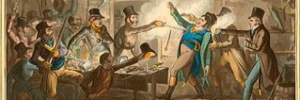It is said that it is bad luck to leave your Christmas decorations up past Twelfth Night. But when is Twelfth Night?
One of the biggest surprises for those on my Victorian Christmas Walk is that at the beginning of the 19th century Christmas was hardly celebrated. It’s hard to imagine that many businesses did not even consider it a holiday and for most it was simply yet another working day. Instead Twelfth Night was the big event in the calendar associated with parties and drinking.
When is Twelfth Night?
As the song goes, there are 12 Days of Christmas. The first day of Christmas being Christmas Day, the birth of the Christ child, and the last being Epiphany the visitation of the three wise men. Christmas Day also happily coincides with the pagan date for mid-winter celebrations.
So, When is Twelfth Night?
Ah well, this is where the confusion occurs. Some say 5 January and others 6 January. Some people count the 12 days of Christmas as kicking off after the main event which would make 6 January to be the Twelfth Night. Others believe Twelfth Night means the night before the Twelfth Day. It really depends on what you count at the first day of Christmas to start the 12 days of Christmas.
When there’s a celebration there is cake! Twelfth Night is no exception.
What is Twelfth Cake?
Put simply, it was a spiced cake. Ingredients included flour, butter, currants, cream, milk, sugar, mace, nutmeg, ginger, eggs and sack (fortified wine). That’s a lot of expensive ingredients and sounds rather rich.
Mr G Button of Fleet Street presented Queen Charlotte with a ‘very large and exceedingly rich’ twelfth cake in 1820. ‘Most beautifully and tastefully ornamented, with Justice standing on a rock, trampling venomous reptiles under her feet, an allusion to her Majesty’s late sufferings and trial. On each side of the rock were horns of plenty, richly overflowing with great abundance of delicious fruits.’ The Times
Originally, this cake has a dried pea and a dried bean to represent the king and queen of the Twelfth Night revels. By the end of the Battle of Waterloo, the dried bean and pea tradition had mostly been phased out and kings and queens were selected in a number of different ways including names in a hat just as famous diarist Samuel Pepys writes:
“In the evening I did bring out my cake – a noble cake, and there cut it into pieces, which wine and good drink; and after a new fashion, to prevent spoiling the cake, did put so many titles into a hat, and so drew cuts; and I was the Queene; and The. Turner, King – Creed, Sir Martin Marr-all; and Betty, Mirs Millicent; and so we were mighty merry till it was night”
There were Twelfth Cakes designed for every pocket, ranging from a few shillings to a couple of guineas. The fashion of looks over substance grew. This involved the windows of confectioner shops being dressed to impress, delighting passers-by ‘One of the most celebrated and attractive displays was that of Birch, the confectioner, No.15, Cornhill, probably the oldest shop of its class in the metropolis. The business was established in the reign of King George I.” Robert Chambers, The Book of Days, a Miscellany of Popular Antiquities, 1862
George Augustus Sala, a journalist and family friend of Charles Dickens often wrote article for Dickens’s magazine Household Words (printed in Wellington Street, Covent Garden). In one article entitled ‘Slang’ Sala criticises the vogue of sizeable Twelfth Cakes using confectioners’ marketing adverts against them: “…touching the use of the terms, ‘monster,’ ‘mammoth,’ ‘leviathan,’ how very trying have those misplaced words become!…every reunion of four-and-twenty fiddlers in a row was dubbed a monster concert, a load made with double allowance of dough was a monster loaf; every confectioner’s new year’s raffle was a monster twelfth cake.”
By the end of the Victorian period the Twelve Days of Christmas had been reduced to just three: Christmas Eve, Christmas Day and Boxing Day. Queen Victoria had felt that celebrating Twelfth Night encouraged drunkenness and debauchery. By the late Victorian period the national importance of Twelfth Night had dwindled, having now been replaced by Christmas Day. The final nail in the coffin for a celebratory Twelfth Night was the passing of the Bank Holidays Act, 1871. Four bank holidays were identified: Easter Monday, Monday in Whitsun week, the first Monday of August and Boxing Day. This Act made it mandatory for businesses to provide paid holidays for these four bank holidays. The London Evening Standard published an article over the loss of ‘old English Holidays’: “Twelfth-night would have long since faded from our list of Christmas gatherings did not the memory of its ancient glories still survive in the custom of Twelfth-cakes for the children. Indeed, almost all of our old holidays have been, to all intents and purposes, superseded by the modern institution of Bank Holidays.”
If you are tempted to make your own Twelfth Night Cake then try a modernised Georgian recipe from the kitchen of National Trust Stowe: https://www.nationaltrust.org.uk/stowe/recipes/twelfth-night-cake
–
Hazel Baker is a qualified CIGA Tour Guide who delivers guided walks and private tours in London. View all of Hazel’s walking tours.



